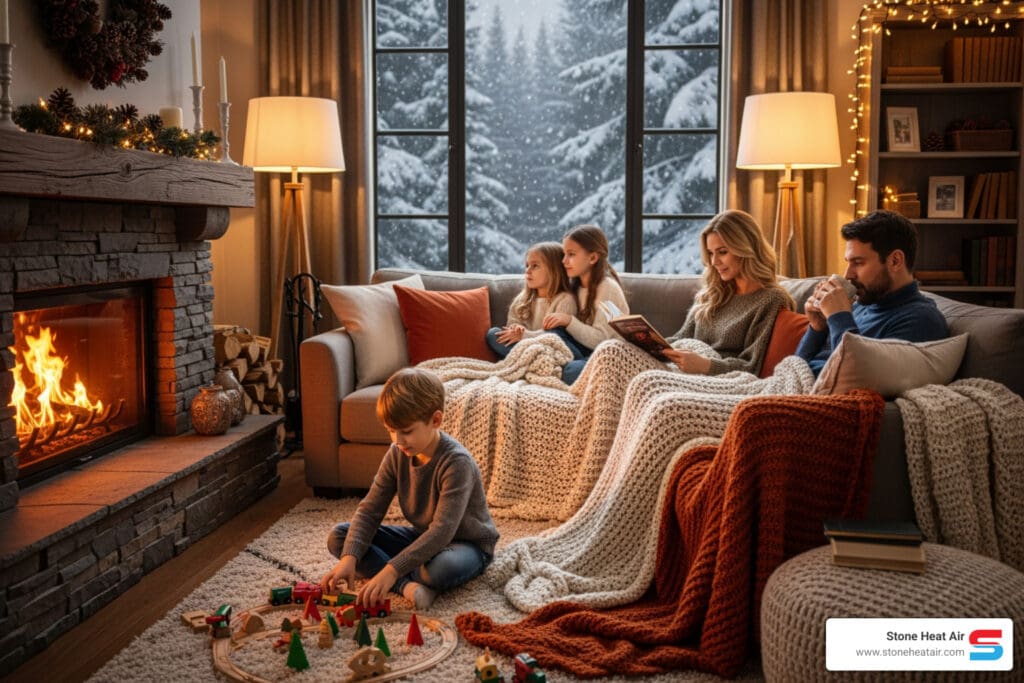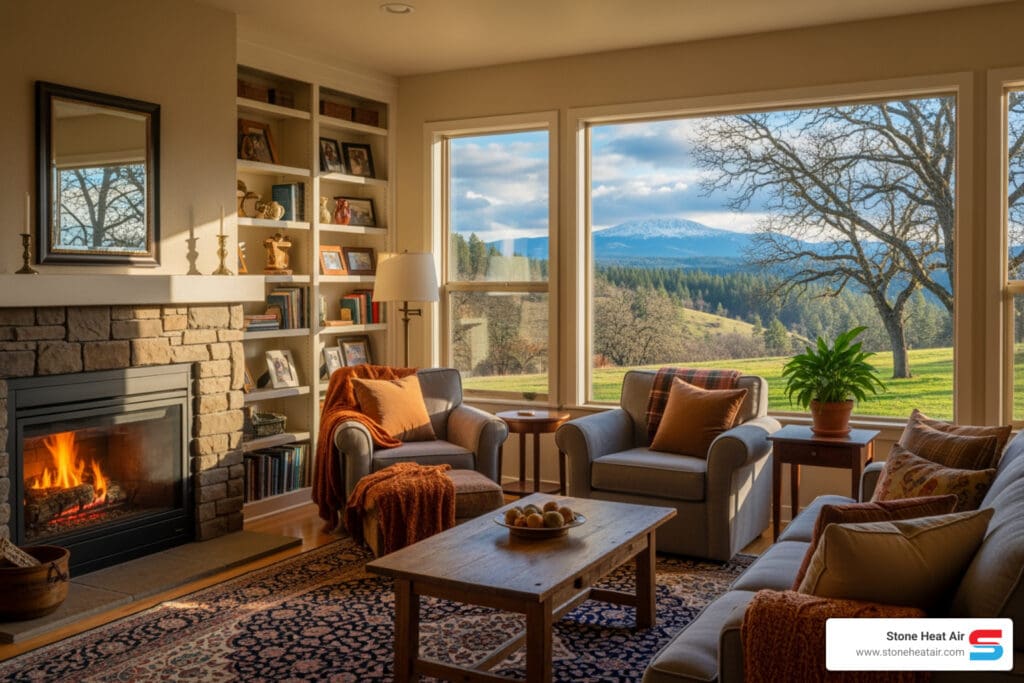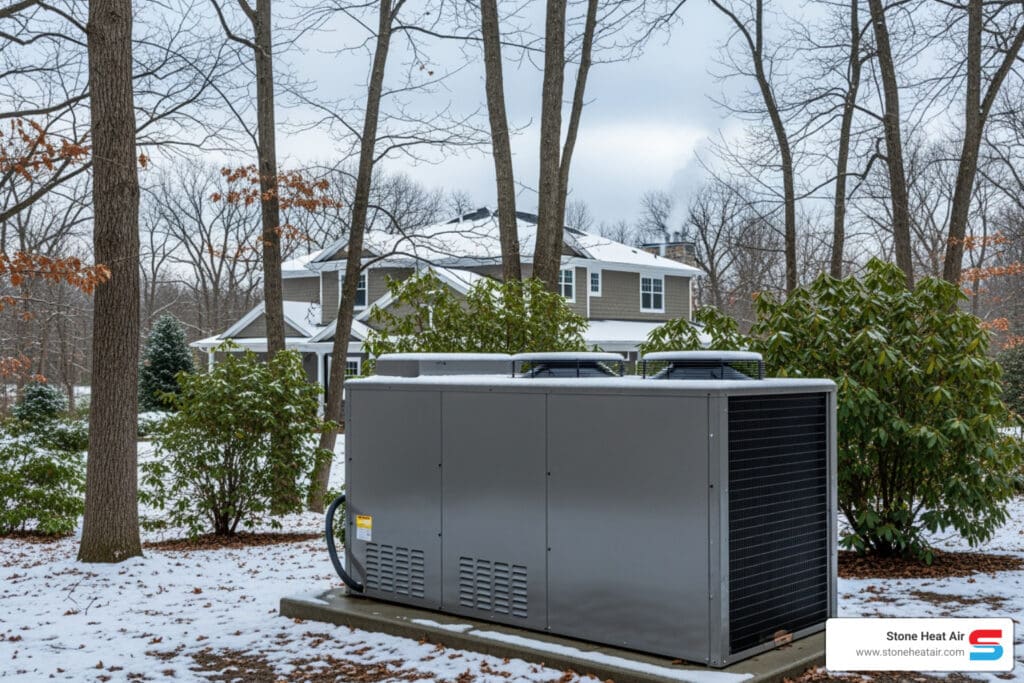Merrill’s Cold Shoulder: Common Reasons Your Heat Pump Blows Cold Air in the Klamath Basin
When Your Heat Pump Feels More Like an Air Conditioner
Heat pump blowing cold air in klamath falls or can be an uncomfortable mystery. Feeling a chilly breeze instead of warm air can be worrying, but the good news is that not every case means a broken system, and some fixes are simple.
Quick Answer: Common Reasons Your Heat Pump Blows Cold Air
- Thermostat is set to cooling mode or fan is on “ON” instead of “AUTO”
- Normal defrost cycle temporarily blows cool air (under 15 minutes)
- Dirty air filter restricts airflow and reduces heating capacity
- Reversing valve stuck in cooling mode instead of heating
- Low refrigerant from a leak prevents proper heat transfer
- Outdoor unit blocked by snow, ice, or debris
- Heat pump temperature feels cool compared to furnace heat (85-90°F vs. 110-140°F)
For expert help diagnosing your system, explore our heating and air conditioning services, or if you need immediate assistance, schedule a service call today.
In the Klamath Basin, your heat pump works hard during freezing winters. Understanding why it might blow cold air helps you know when to troubleshoot and when to call Stone Heating and Air for professional support.
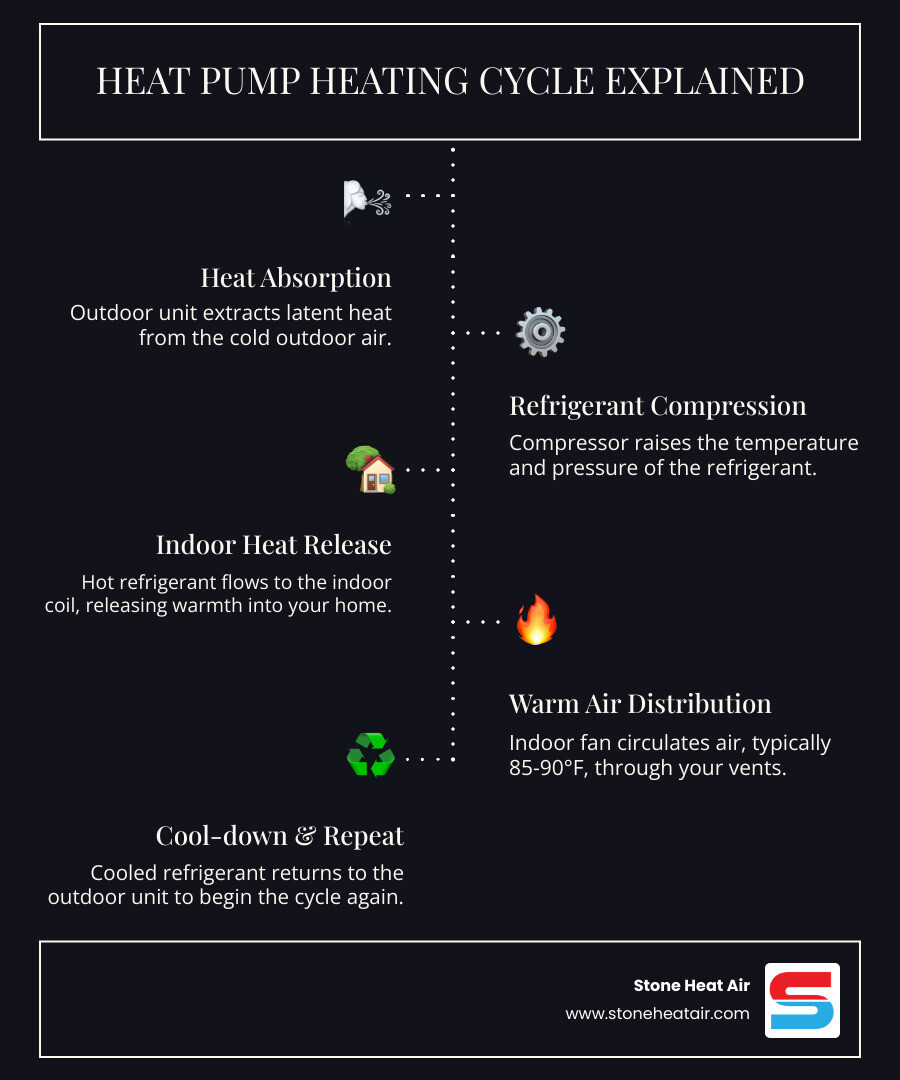
Is It Really Cold? Understanding Heat Pump Operation
It might surprise you, but when your heat pump blowing cold air in klamath falls or seems to be a problem, it could be working perfectly. This is a common misunderstanding, especially for those used to traditional furnaces.
The secret is how different systems deliver warmth. A furnace delivers air between 110 and 140°F, which feels instantly hot. A heat pump, however, provides air between 85 and 90°F. This is warm enough to heat your home but is cooler than your body temperature.
| Heating System Type | Typical Supply Air Temperature |
|---|---|
| Heat Pump | 85 to 90°F |
| Furnace | 110 to 140°F |
The 85-90°F air from a heat pump vent can feel cool against your skin, but it’s still effectively heating your space with a gentler, more consistent warmth.
To check if your system is malfunctioning, perform a simple supply air temperature test. Use a thermometer to measure the air temperature at a return vent (where air enters the system) and a supply vent (where heated air exits). Then, calculate the difference.
A temperature difference of 15 to 30 degrees hotter at the supply vent means your heat pump is working correctly. A smaller difference indicates a problem that needs further investigation.
Simple DIY Checks Before Calling for Service
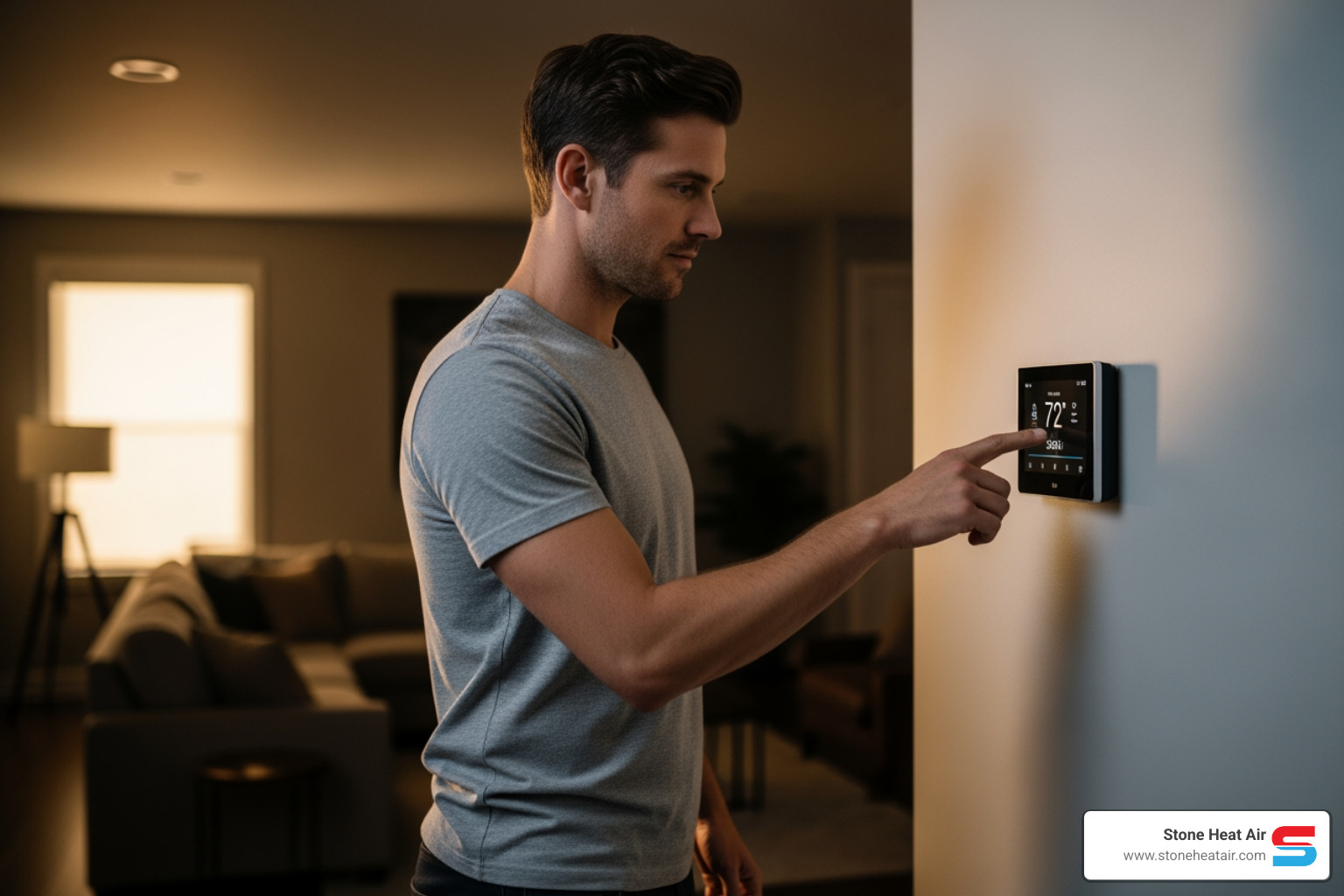
If your heat pump blowing cold air in Klamath Falls, OR has you concerned, don’t panic. Many homeowners can solve the issue with a few simple troubleshooting steps, saving time and money.
Check Your Thermostat Settings
It’s easy for thermostat settings to get mixed up. First, confirm your system is set to HEAT mode. If not, switch it and wait a few minutes.
Next, set the fan to AUTO, not ON. The ON setting circulates air continuously, even between heating cycles, which can feel cool.
Also, ensure the temperature setting is higher than the room temperature. Weak or dead thermostat batteries can cause issues, so replace them if needed. For smart thermostats, a quick reset might resolve glitches.
Inspect and Change Your Air Filter
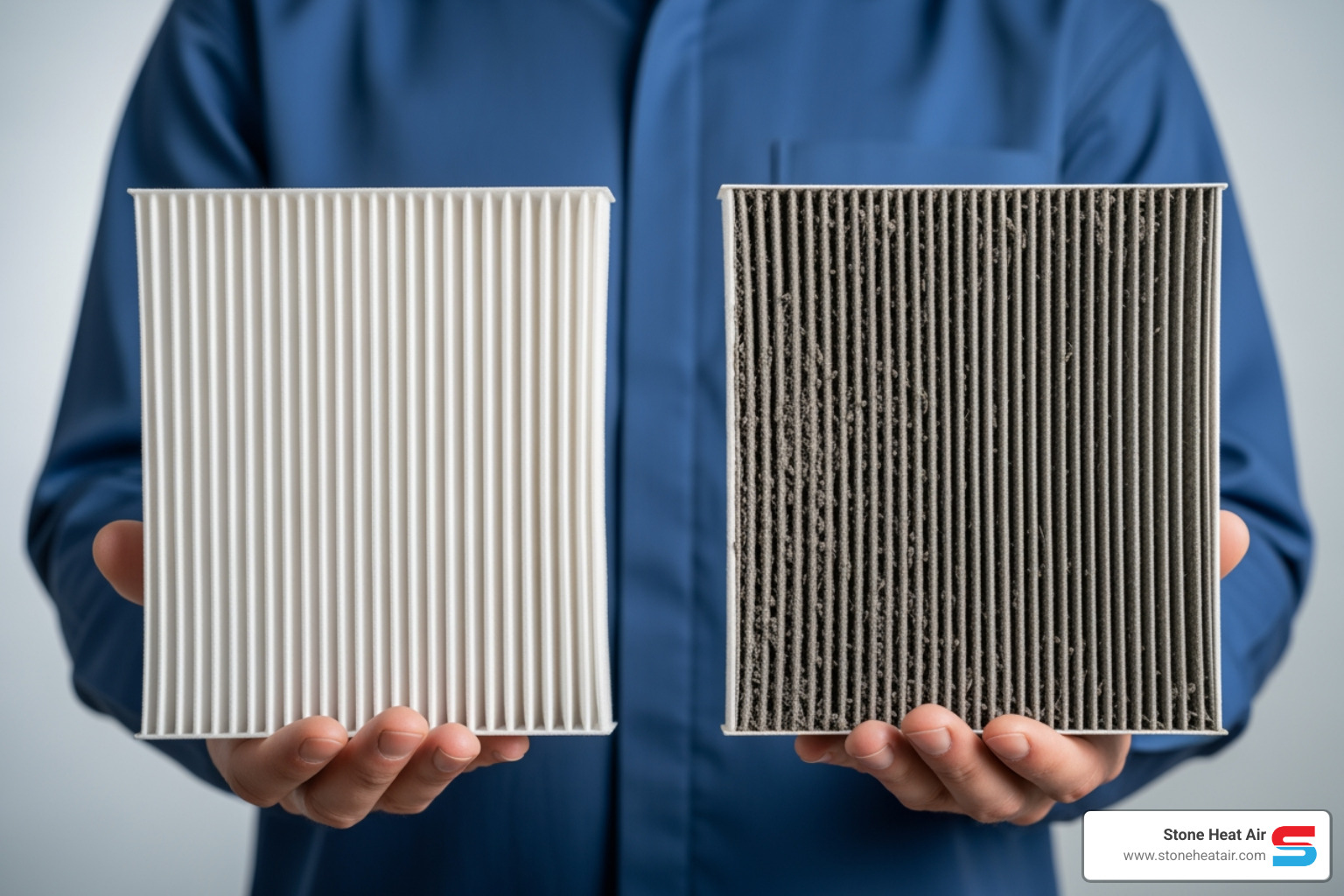
A clogged air filter is a common and simple-to-fix cause of heat pump problems. Your air filter traps dust and debris, and over time, it can clog and restrict airflow. This forces your system to strain, leading to reduced heating capacity and cool air from your vents. A severely blocked filter can even cause the indoor coil to freeze, requiring a service call.
Generally, replace your filter every 90 days. However, with pets, allergies, or recent remodeling, you may need to change it every 30 to 60 days. If you can’t see light through the filter, it’s time for a new one.
Clear the Outdoor Unit
Your outdoor unit needs clear space to work, especially in freezing temperatures. Check your unit for leaves, twigs, dirt, or snow buildup. Debris can restrict the airflow needed to pull heat from the outside air.
In winter, snow and ice buildup is a concern. While light frost is normal, heavy snow or ice can block the unit. Gently brush away snow. For ice, you can pour warm water over it, but never use sharp tools that could damage the coils.
For safety, always power off the unit at the circuit breaker before cleaning. After clearing obstructions, restore power and check performance.
If these checks don’t solve the problem, it may be a deeper issue requiring professional help.
Why Your Heat Pump is Blowing Cold Air in Klamath Falls, OR: Deeper Issues
If DIY checks fail, your heat pump blowing cold air in Klamath Falls, OR may have a more complex issue. These problems, like mechanical failures or refrigerant complications, require professional diagnosis. Attempting these repairs yourself can be dangerous and void your warranty. Here are common mechanical problems we see.
Understanding the Defrost Cycle
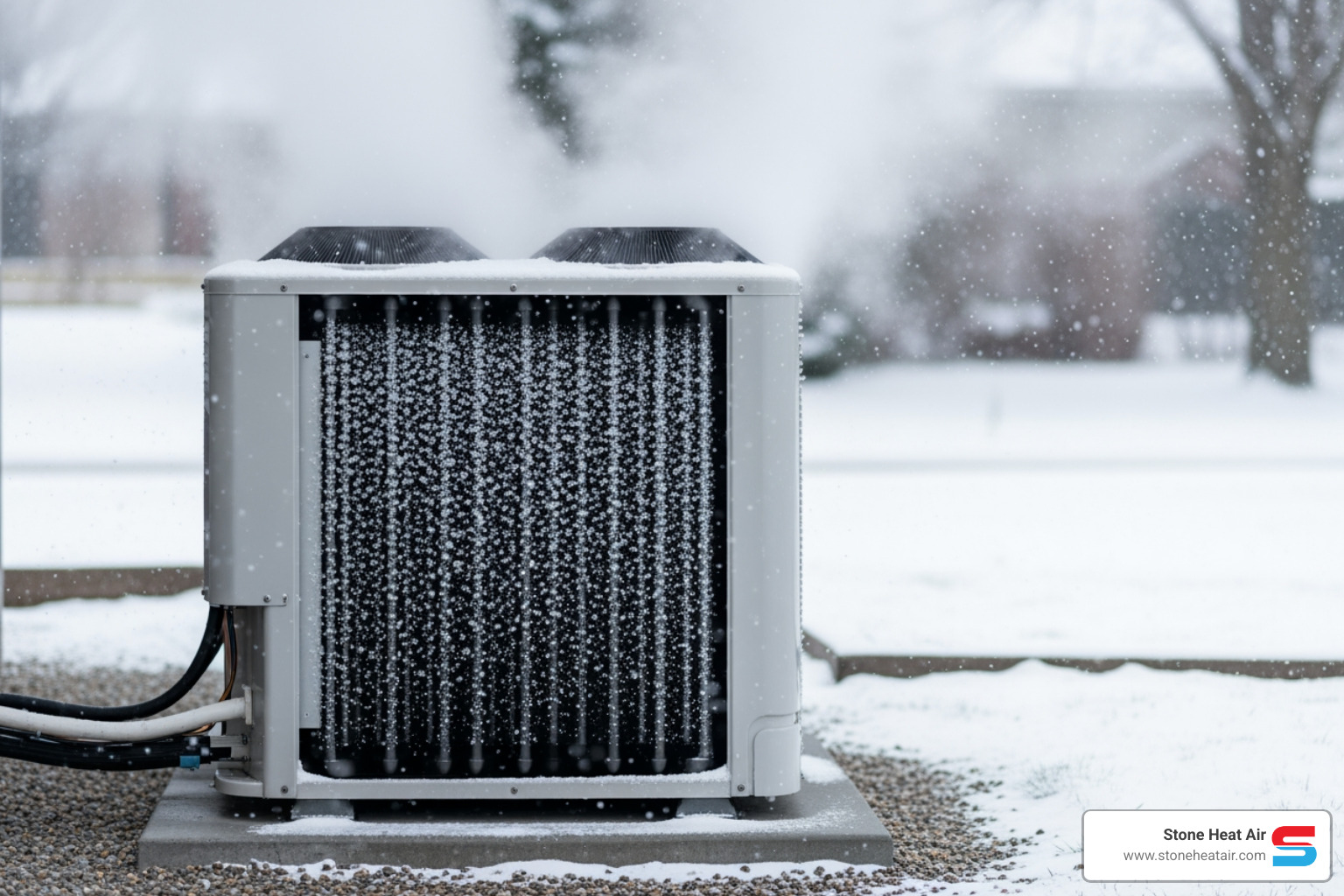
Surprisingly, a heat pump blowing cool air for a few minutes can be a sign it’s working correctly. In cold climates, the outdoor unit naturally frosts over as it extracts heat from the air. To remain efficient, the heat pump runs a defrost cycle. It temporarily reverses to cooling mode to warm the outdoor coil and melt the frost. During this time, you’ll feel cooler air from your vents and may see steam from the outdoor unit.
A normal defrost cycle lasts under 15 minutes and occurs every 30 to 90 minutes in cold weather. If cool air only lasts a few minutes before warm air returns, the system is functioning properly. However, if cool air lasts longer than 15 minutes or the outdoor unit remains encased in ice, the defrost cycle may be malfunctioning.
Malfunctioning Reversing Valve
The reversing valve allows your heat pump to both heat and cool by directing the flow of refrigerant. If the valve malfunctions or gets stuck, your heat pump can be trapped in cooling mode, blowing cold air even when set to heat.
Clicking or hissing noises from the outdoor unit can indicate the valve is struggling. If it gets stuck midway, it can cause inconsistent temperatures. Causes for malfunction include electrical problems, refrigerant leaks, contamination, or simple wear and tear. Repairing a reversing valve requires professional expertise and specialized tools.
Low Refrigerant Levels
Refrigerant is essential for transferring heat. It circulates in a sealed system and, unlike fuel, is not consumed during operation. Therefore, low refrigerant always indicates a leak. A small leak can drain the system over time, reducing its heating ability.
With low refrigerant, the system can’t transfer enough heat. You’ll notice reduced heating capacity, constant running, and eventually, cool air. Hissing or gurgling sounds can signal a leak. Ice on the indoor coil or refrigerant lines outside of the defrost cycle is another sign.
An EPA-certified professional must handle refrigerant issues. They will locate and repair the leak before recharging the system to the correct specifications. Simply adding refrigerant without fixing the leak is only a temporary solution. Professional service is crucial, as improper handling is dangerous and incorrect recharging can damage your compressor. Regular maintenance helps detect leaks early.
When to Call a Professional for Your Heat Pump
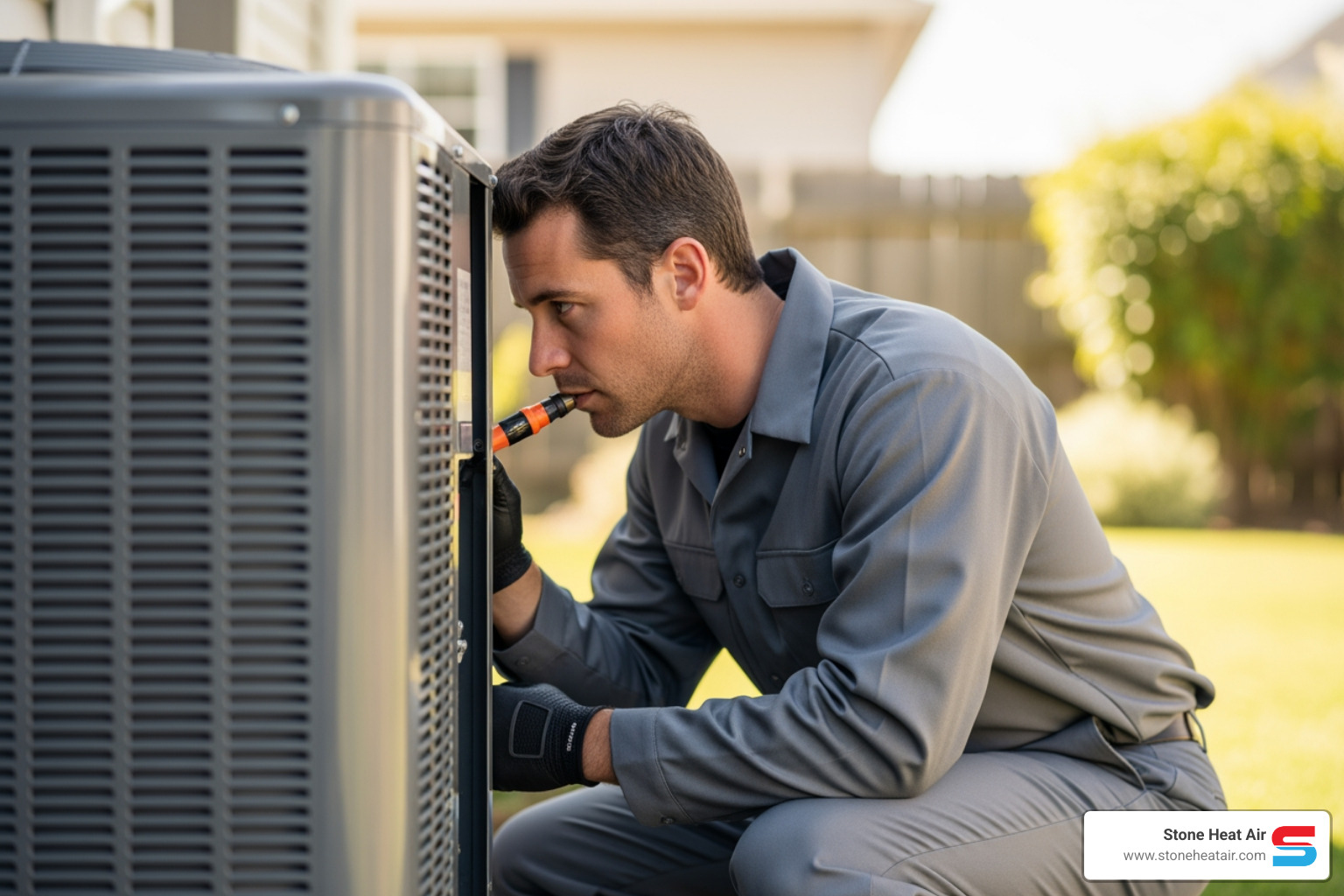
While DIY troubleshooting is great, some heat pump issues require a professional. These systems involve complex electrical and refrigerant components. Attempting advanced repairs can be risky, void your warranty, or worsen the problem. Our team at Stone Heating and Air is trained to diagnose and repair issues safely and quickly.
Signs You Need an Expert for a Heat Pump Blowing Cold Air in Klamath Falls, OR
Here are signs your heat pump blowing cold air in Klamath Falls, OR needs professional attention:
- Your DIY steps didn’t work: If you’ve tried the basics and cold air persists, it’s time for an expert.
- Frequently tripped circuit breakers: This indicates an electrical problem, such as a short circuit or wiring issue. For safety, this requires a licensed professional.
- Loud or unusual noises: Grinding, squealing, hissing, or gurgling can signal failing motors, fan issues, or refrigerant problems. These mechanical failures require professional attention.
- Frozen coils that won’t clear: Thick ice that persists beyond a normal defrost cycle points to a more serious issue like restricted airflow, a refrigerant leak, or a faulty defrost system.
- System won’t turn on: If basic checks fail to start the system, an internal component has likely failed and needs professional diagnosis.
The Importance of Regular Maintenance
The best way to fix a broken heat pump is to prevent it from breaking. That’s the goal of regular maintenance.
During a routine maintenance visit, our technicians inspect your system, clean components, check refrigerant levels, and test electrical connections. This helps catch small issues before they become expensive emergencies. A well-maintained heat pump runs more efficiently, saving you money on energy bills, and extends its lifespan, which is typically around 15 years.
Maintenance is also key for identifying refrigerant leaks early. Finding a leak during a routine visit prevents the slow performance decline that can leave you in the cold.
We recommend scheduling maintenance twice a year, in spring and fall, to ensure your system is ready for both cooling and heating seasons. Our Stone Comfort Membership Club simplifies maintenance with regular check-ups and priority service. It’s peace of mind knowing your system is cared for by professionals.
Frequently Asked Questions about Heat Pumps in the Klamath Basin
Homeowners in the Klamath Basin often have similar questions about their heat pumps in winter. Here are answers to some common concerns.
Why does my heat pump run constantly in the winter?
A constantly running heat pump can be concerning, but it’s not always a sign of trouble, especially during the coldest months. Common reasons include:
- Extreme cold: When temperatures drop well below 40°F, your heat pump works harder and runs longer to extract heat from the cold air.
- Dirty air filter: Restricted airflow from a clogged filter makes your system run longer to reach the set temperature.
- Undersized system: If your heat pump is too small for your home, it will struggle to keep up and run constantly.
- Poor insulation: Drafty windows or poor insulation let heat escape, forcing your system to run continuously to compensate.
- Thermostat setting: A very high temperature setting on a very cold day will make your heat pump work tirelessly.
Is it normal for my outdoor heat pump to be covered in frost?
Yes, a light layer of frost on your outdoor unit is normal in cold weather. It shows the heat pump is working, as moisture freezes on the coil while it extracts heat from the air. The system’s automatic defrost cycle handles this by periodically warming the coil to melt the frost. This cycle lasts under 15 minutes and is normal.
However, a heavy, solid layer of ice that doesn’t melt is not normal. This could indicate airflow problems, a malfunctioning defrost control, or low refrigerant levels. If your unit is heavily iced over, call a professional. Persistent ice buildup harms efficiency and can cause serious damage.
When should I consider replacing my heat pump instead of repairing it?
Deciding whether to repair or replace your heat pump is a major decision. Sometimes, replacement is the smarter long-term choice. Consider these factors:
- Age: If your unit is 10-15 years old and needs frequent repairs, it may be time to replace it. Older units are less efficient and cost more to run.
- Repair cost: If a major repair is needed or you’re facing frequent repair bills, replacement might be more cost-effective than continuing to fix an unreliable unit.
- Energy efficiency: New high-efficiency models can significantly lower your energy bills, helping the investment pay for itself over time.
- Refrigerant type: Older systems may use refrigerants that are being phased out and are expensive. If your system has a leak, repairs can be costly or difficult.
We provide an honest assessment to help you compare the long-term benefits of repair versus replacement, allowing you to make the best choice for your home and budget.
Conclusion: Restoring Warmth to Your Klamath Falls Home
A heat pump blowing cold air in Klamath Falls, OR can often be fixed with simple solutions, like adjusting the thermostat, changing the air filter, or clearing the outdoor unit. The key is knowing what’s normal. Heat pump air feels cooler (85-90°F) than furnace air, and a brief, temporary blast of cool air during a defrost cycle (under 15 minutes) is a sign of proper function.
If simple fixes don’t work, the problem could be a malfunctioning reversing valve, low refrigerant, or frozen coils, which all require professional repair.
Proactive maintenance is your best defense. Regular tune-ups improve efficiency, prevent major breakdowns, and extend your system’s lifespan, ensuring year-round comfort.
At Stone Heating and Air, we’re committed to keeping your home warm during Klamath Falls winters with honest, fair service. Our team is available 24/7 for routine maintenance or emergency repairs because your comfort can’t wait.
If troubleshooting doesn’t work, we’re ready to help. Explore our complete heating and air conditioning services to learn more about how we keep Klamath Basin homes comfortable all year long. Let us restore the warmth and peace of mind your home deserves.
Category: HVAC
Request An Appointment
Related Content
